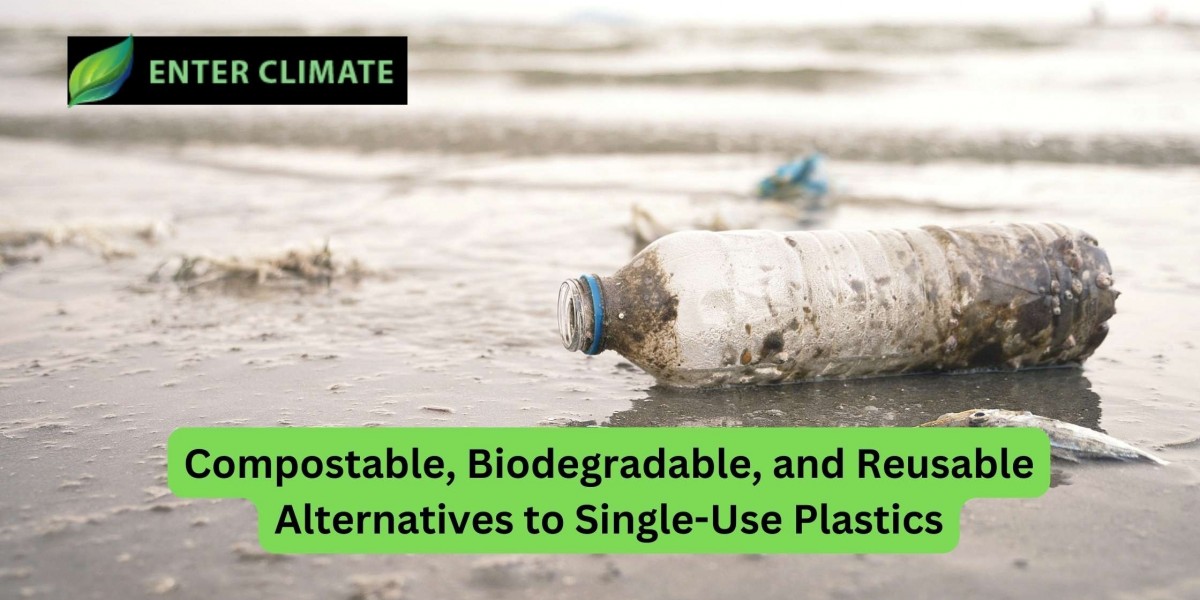Introduction
We’ve all heard about the problems plastic waste causes in our world whether it's littering our streets, polluting our oceans, or harming wildlife. Single-use plastics, like straws, plastic bags, and packaging, are used for just a few minutes but can stay in the environment for hundreds of years. That’s a big issue!
Luckily, we don’t have to keep using these harmful plastics. There are better alternatives that can help reduce plastic waste and protect our planet. In this blog, we’ll take a look at three main alternatives: compostable, biodegradable, and reusable products. We’ll explain what they are, why they matter, and how they can help with plastic waste management.
What Are Compostable, Biodegradable, and Reusable Alternatives?
1. Compostable Alternatives
Compostable products break down into natural materials like water, air, and organic matter (like dirt or plants) when they’re disposed of in the right conditions, like a compost pile. This means they won’t stick around for years like plastic does.
Some examples of compostable alternatives are:
- Compostable Plates and Cutlery: Made from things like sugarcane, bamboo, or cornstarch, these are used in places like restaurants or for parties instead of plastic plates and forks.
- Compostable Packaging: Packaging made from plant-based materials, like cornstarch or cellulose, instead of plastic.
- Compostable Cups and Straws: These are usually made from plant-based plastics, like PLA, and break down quickly when put in compost.
Why compostable products are awesome:
- They break down quickly and naturally when in the right composting environment.
- They help reduce plastic waste, which is great for the planet.
- Businesses can show they care about the environment by using compostable products.
However, compostable products need to be thrown away in special composting systems. If they end up in regular landfills, they might not break down as quickly.
2. Biodegradable Alternatives
Biodegradable products are designed to break down naturally, but they don’t need a composting system to do so. They still break down over time with the help of bacteria, fungi, or other natural processes.
Some examples of biodegradable alternatives are:
- Biodegradable Bags: These are made from materials like plant starches or recycled paper, and they break down faster than plastic bags.
- Biodegradable Plates and Utensils: These are often made from bamboo or palm leaves and can break down naturally when thrown away.
- Biodegradable Film: Used for food packaging, it’s made from things like seaweed or cornstarch and breaks down naturally.
Why biodegradable products are good:
- They break down more quickly than plastic, so they have less chance of sticking around for years.
- They’re made from renewable resources, meaning they come from plants or natural materials, not from petroleum (like plastic).
- There are many options to choose from, so it’s easy to find biodegradable alternatives for different needs.
Just like compostable products, biodegradable ones still need to be disposed of properly to break down correctly.
3. Reusable Alternatives
Reusable products are the best option when it comes to reducing plastic waste. Instead of using something once and throwing it away, reusable items are made to be used over and over again. They’re designed to last, so you don’t need to keep buying disposable items.
Some examples of reusable alternatives are:
- Reusable Bags: Made from durable materials like cotton or jute, these replace the need for plastic bags when shopping.
- Reusable Water Bottles and Coffee Cups: Stainless steel, glass, or BPA-free plastic bottles and cups can be used many times instead of buying plastic water bottles or disposable cups.
- Reusable Straws: Made from stainless steel, silicone, or bamboo, these straws can be used again and again instead of plastic straws.
- Reusable Food Containers: Made from glass or stainless steel, these containers can replace plastic containers and plastic wrap.
Why reusable products are the best:
- They last a long time and can be used many times, so you don’t need to keep buying new ones.
- They reduce the amount of waste you create, which helps reduce pollution.
- They save money over time, as you won’t have to buy disposable products.
Of course, reusable items only work if you remember to use them! It takes some effort, but they’re one of the best ways to cut down on plastic waste.
How These Alternatives Help with Plastic Waste Management
Effective plastic waste management is all about reducing, reusing, and recycling. These eco-friendly alternatives help by:
- Reducing Plastic Use: By choosing compostable, biodegradable, and reusable products instead of single-use plastics, you’re cutting down the amount of plastic you use each day.
- Helping the Environment: Compostable and biodegradable products break down much faster than plastic, so they don’t sit in the environment for years. Reusable products reduce the amount of new plastic needed in the first place.
- Supporting a Circular Economy: Reusable products are the backbone of a circular economy, where products are reused as much as possible, reducing waste and the need for new resources. Compostable and biodegradable products also fit into a system where waste is turned into something useful, like compost for growing plants.
Businesses and consumers that switch to these alternatives help the planet and reduce the harmful effects of plastic pollution. Plus, companies that use these products can show their customers that they care about the environment.
Conclusion
Switching from single-use plastics to compostable, biodegradable, and reusable alternatives is one of the best things we can do to reduce plastic waste. These products help minimize pollution, reduce harm to wildlife, and make the planet a cleaner place for everyone.
Whether you’re a business looking to make better choices or someone just trying to reduce your personal plastic use, these alternatives are a great place to start. By choosing eco-friendly options, we can all play a role in solving the plastic waste crisis.
Frequently Asked Questions (FAQs)
1. What’s the difference between compostable and biodegradable products?
Compostable products break down into natural materials like water and soil in composting systems. Biodegradable products break down naturally in the environment but don’t necessarily need a composting system. Both are better than plastic, but compostable items need specific conditions to break down properly.
2. Are reusable products really better than biodegradable alternatives?
Yes, reusable products are usually the best option. They can be used many times, which helps reduce the need for disposable items. Biodegradable items still break down over time, but they don’t last as long as reusable products.
3. How can businesses encourage people to use reusable products?
Businesses can offer discounts or rewards for customers who bring their own reusable bags, cups, or containers. They can also educate people about the environmental benefits of reducing plastic use and make it easy to choose reusable products by selling them in stores.








